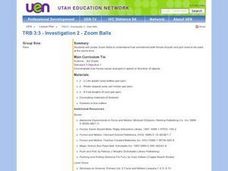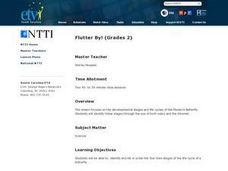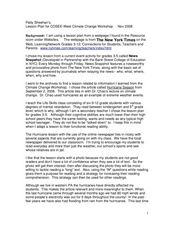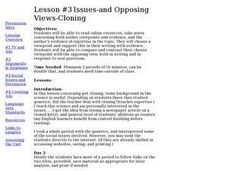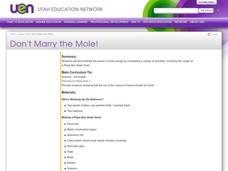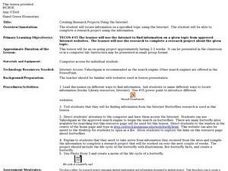Curated OER
Investigation 2 - Zoom Balls
Third graders create Zoom Balls to explain how sometimes both forces of push and pull need to be used at the same time.
Curated OER
Ammonium Nitrate - Efficient Fertilizers
Students study the chemistry of ammonium nitrate and consider the advantages and disadvantages of this compound. They compare different fertilizers and calculate the molar mass and percent nitrogen in the different fertilizers.
Curated OER
Flutter By!
Second graders identify and list the four main stages of a life cycle of a butterfly. In this butterfly lesson plan, 2nd graders use the internet and videos to learn about the life cycle and be able to list them on their own.
Curated OER
Dissecting Squid
Second graders explore biology by dissecting an animal. In this squid anatomy lesson plan, 2nd graders collaborate in pairs to investigate the inner body systems of a recently deceased squid. Students utilize plastic knives to cut the...
Curated OER
Identifying Seasonal Animal Behaviors
Students discuss seasonal behavior of different animals. They participate in group activities and identify animals. They also examine the changes in seasons and how animals act differently in different seasons.
Curated OER
Project 1
Learners are given a coin to observe and make inferences about. Using a worksheet, they make two columns to list their observations and inferences in an organized manner. They develop a hypothesis based on one of the inferences and...
Curated OER
West Climate Change
Students read an internet article about hurricanes. In this hurricane lesson, students explain how they form and the damage they bring. They analyze the article and answer questions about it.
Curated OER
Classification Schemes
Students place organisms into the correct classification and justify their reasoning. They must include all objects and have a reason for their decisions.
Curated OER
Volcanoes And Atmospheres
Students identify the volcano as the primary source of atmospheric gases, to explain the formation of ozone, and to recognize the dangers of volcanic gases through the use of technology in the classroom.
Curated OER
Weatherman Phil
Third graders examine the life of a groundhog and their role in predicting weather. They write a postcard or a letter to Punxsutawney Phil on the Internet.
Curated OER
Issues and Opposing Views: Cloning
Students complete analysis activities to compare and contrast an opposing view point in writing and orally. In this opposing views lesson, students complete research about cloning. Students make presentations for their view points on the...
Curated OER
Waterworks
Students investigate the water quality of a river. In this water quality lesson plan, students use microscopes, probing devices, and global positioning systems to determine water quality and create presentations on it.
Curated OER
How Does Climate Affect Plant Growth?
First graders compare plant samples obtained from two different sites to explore how climate affects plants.
Curated OER
Don't Marry the Mole!
Third graders demonstrate the power of solar energy by completing a variety of activities, including the creation of a Pizza Box Solar Oven.
Curated OER
Take A Meal Worm To Lunch
Seventh graders, using a magnifying glass, observe mealworms in a cup.
Alabama Learning Exchange
Mars Metal Rover
Middle schoolers examine the properties of metal that can be used on the surface of Mars. They research the Internet to determine the properties of Mars and determine which metals are compatible. They create a slide show presentation of...
Curated OER
Nothing New? A Physical Change
Fifth graders discuss the differences between chemical and physical changes. In groups, they complete experiments and discover how a physical chnage can be reversed. To end the lesson, they review the steps of the water cycle and...
Curated OER
Ammonium Nitrate - Is it worth the Risk?
Students consider that ammonium nitrate is used as a fertilizer and an explosive. They study the chemistry of ammonium nitrate and consider the advantages and disadvantages of this compound. The dual nature of Ammonium Nitrate was...
Curated OER
Creating Research Projects Using the Internet
Students discuss methods of locating information on the internet. They visit a specific website about butterflies and explore its homepage and web links. As students examine the site, they take notes and organize information for a...
Curated OER
What Is Our Plan?
Students identify ways to handle pet emergencies. In this animal welfare lesson, students create a list of top ten pet emergency planning tips and checklist. Students construct an "Pet Emergency Kit."
Curated OER
How Do Values Shape Conflicts?
Students work through conflict. In this conflict resolution lesson, students participate in a simulation that requires them to consider both sides of the whaling issue.
Curated OER
No Fossils in This Fuel!
Learners explain how technology leads to a cleaner environment. They gain hands-on experience with ethanol as a fuel alternative.
Curated OER
Protect the Bats!
Students explore bat habitats. In this bat lesson, students discover the work of people trying to protect bat habitats. Students make posters that promote the message of saving bats.
Curated OER
A Visit to a North Carolina Museum
Students visit the North Carolina Aquariums website and gather the information requested to complete a worksheet. They use this information to write a story about their imaginary trip.
